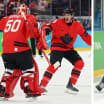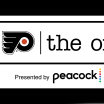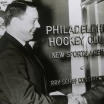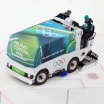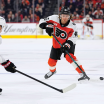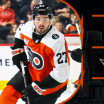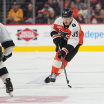Flyers general manager Chuck Fletcher spoke with members of the media to dissect what went right and wrong with the team's 2019-20 season, which ended with the team falling one win short of reaching the Eastern Conference Final but never finding the same all-around groove in the playoffs that they had during the regular season. Fletcher also laid out a rough framework for areas of concentration during the abbreviated offseason.
Here are 5 key quotes from his Exit Day media availability:
Exit Day: 5 Key Quotes from Fletcher
Flyers GM Chuck Fletcher spoke with media to dissect what went right and wrong with the team's 2019-20 season
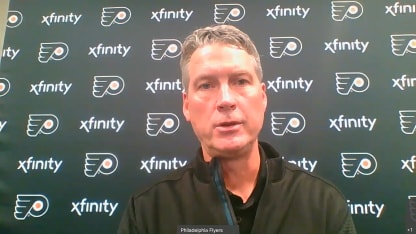
By
Bill Meltzer
philadelphiaflyers.com
1. "There was not the same intensity in the round robin. Our guys made adjustments as the playoffs went on."
Did the Flyers 3-0-0 record during the round robin raise false hopes that the team would be able to quickly get back to a comparable level of all-around play to how the Flyers played in the 26 games leading up to the leaguewide pause? Fletcher said that the biggest difference between the round robin and the First Round and Second Round series was the shift-in and shift-out emphasis on battling for every inch of real estate on the ice. The stakes were raised once elimination or advancement was involved, rather than merely playoff seeding.
"The pause was in March, so I'm not sure there's much correlation to what happened in the bubble. It was almost two different seasons,"Fletcher said.
Throughout his Exit Day discussion, whenever the Flyers general manager referred to performance, stats and trends during the postseason, he cited the 13-game sample size of the Montreal and Islanders series. He did not fold the round robin into the discussion.
2. "My biggest disappointment from the playoffs, is I thought our defensive detail slipped. The way we played our game prior to the pause, I don't think we brought that game to the playoffs. Maybe when you're struggling to score, you cheat a little."
Even excluding the round-robin, the Flyers shut out Montreal twice, held them to a single goal in the series opener and then two goals in the clinching sixth game. However, the Canadiens controlled much of the play over the course of the series. A combination of stellar goaltending from Carter Hart and generally solid team defense in third-period closeouts lifted the team to a series win. In the Islanders series, the Flyers had trouble keeping the puck out their own net. The Islanders scored three or more goals in every game of the series, and it was primarily due to turnovers, and broken coverages.
In regard to the question over whether the Flyers have sufficient team speed, Fletcher said much of the issue stemmed from the team committing more turnovers in the playoffs than in the regular season. This had the compounding effect of longer shifts, more time spent defending and, most damagingly of all, contributed directly to several critical goals against that either broke tie scores or turned one-goal deficits into two.
"When you turn pucks over, it's hard to play fast,"Fletcher said.
3. "We'd all love another goal scorer. The top guys didn't produce, but they had a lot of zone time, shot share and expected goal numbers were good, they just couldn't seem to score. But you've got to be careful sometimes of putting too much into any 13-game sample size."
The GM noted that, the offensive bottom line of the First Round and Second Round was that the team needed more goal production than it received from its top offensive players, including Travis Konecny, Claude Giroux, Sean Couturier and Jakub Voracek (who produced very well during the Montreal series but had only one point in the Islanders series). This was both a five-on-five issue, although the GM said that he felt the process was coming along in the New York series from Games 2 to 6, as well as a power play issue. Fletcher said the team was excessively streaky on the power play in the regular season but the overall numbers were acceptable. Thing never got on track with the power play during the playoffs, however. He also discussed how the team had made strategic tweaks (such as moving players to different sides to create varying looks) and personnel tweaks over the course of the season. Figuring out what went wrong with the power play in the playoffs is an order of business to be addressed this offseason.
It wasn't just the top-end scoring, though. Fletcher said one of his disappointments during the playoffs was a need for more offensive pressure and production from the bottom six of the forward lineup. During the round-robin, the Flyers received goals from Nate Thompson, Michael Raffl, Tyler Pitlick, Nicolas Aube-Kubel (two in one game). During the Montreal and Islanders series, Raffl contributed three goals (two came while moved up in the line rotation) and Pitllick scored one. Derek Grant, who had five points in seven regular season games after coming over to Flyers from Anaheim. had one assist to show for dressing in 12 of the 13 games.
4. "If the cap is flat for three years, some teams don't have space. Other teams, their young players are going to need new contracts. There's not a lot of liquidity in the system for three years. We have room to do our business, but not a lot of room."
Due to the NHL cap ceiling and floor remaining flat for the 2020-21, 2021-22, and 2022-23 seasons, a large portion of the NHL is going to have to be creative in filling team needs and judicious in how money is allocated to bringing in free agents. Fletcher also pointed out that teams have to plan proactively for the expiration of some young players' entry-level contracts and the raises they will receive in future contracts. For example, the Flyers this season have to be mindful of the fact that Carter Hart will be a restricted free agent next summer and Travis Sanheim will be an arbitration-eligible RFA in a year.
For these reasons, Fletcher does not anticipate that the Flyers will be able to be major players in the unrestricted free agent market this summer or the next few offseasons, unless there are leaguewide market-driven adjustments due to the sheer number of teams that are either currently strapped by the cap or could be within the next year or two. However, the GM is open to trade discussions and plans to see what can be done on the trade front if there are opportunities to fill needs that way. He will also monitor free agency because sometimes there are budget-workable options that can help a team.
As particular areas of focus, Fletcher feels that defensive depth and the bottom six of the lineup are two areas of need that he'd like to address. Additionally, the Flyers must either re-sign Brian Elliott as the other half of the goaltending tandem with Hart, or scour other options on the market. Adding another goal scorer would be desirable but is a challenge to accomplish, and solutions may need to come from within via the continued development of young players.
5. "We have a lot of young players that are either on the team or pushing their way to be on the team. I don't think it makes sense to do a 180 and change our philosophy.. I don't expect us to be a major player in free agency over the next few years."
First and foremost, Fletcher does not intend to abandon the plan to continue to supplement the roster largely through the development of homegrown talent. The plan started during Ron Hextall's regime, and has started to bear some fruit. This season, Phil Myers, Travis Sanheim, Konecny and rookie Joel Farabee also advanced their games at the NHL, while prospects such as rookie Morgan Frost got their first taste of the NHL while also playing much of the season at the American Hockey League level.
The timetable for starting the AHL's 2020-21 regular season could vary from the NHL's plan, because there's a different economic model in place. If the AHL season is delayed, the NHL will at some point provide guidance on how NHL teams can, in the short-term, handle prospects who'd be ticketed for AHL development time. In some cases, NHL teams have loaned contracted prospects to teams in Europe for the interim. The Flyers have already done so with recently signed forward Linus Sandin, and Phantoms wingers Maksim Sushko and David Kase.

